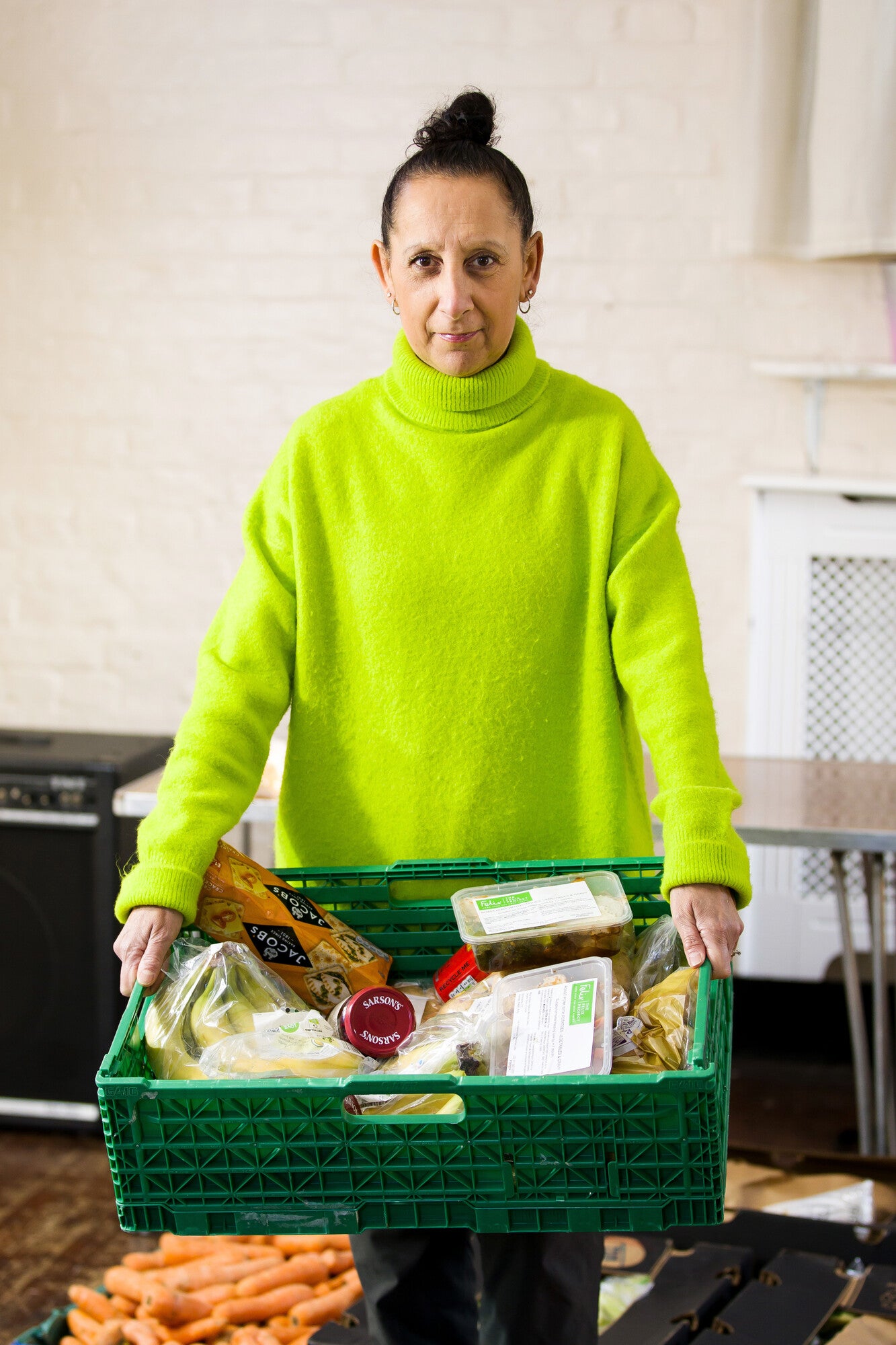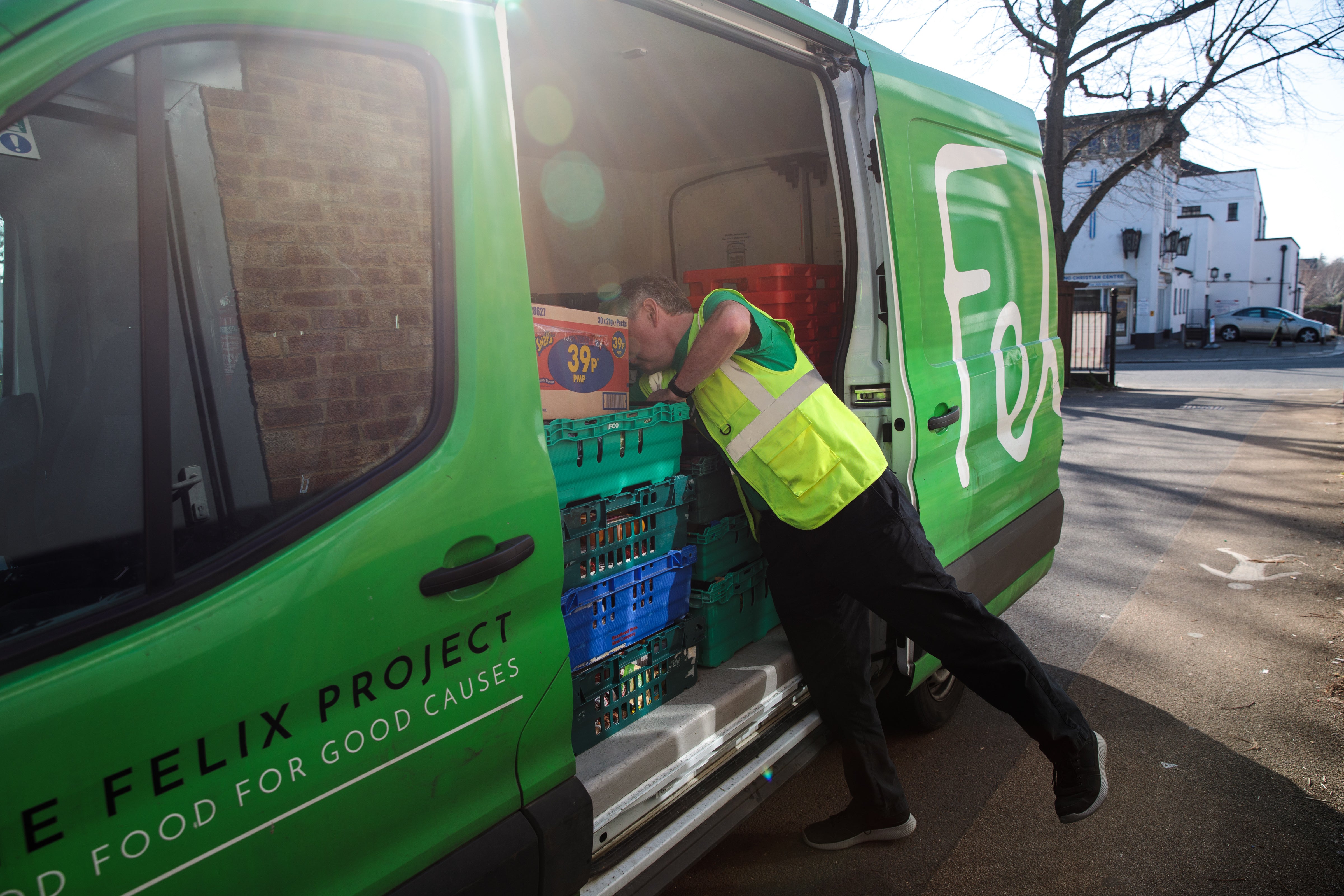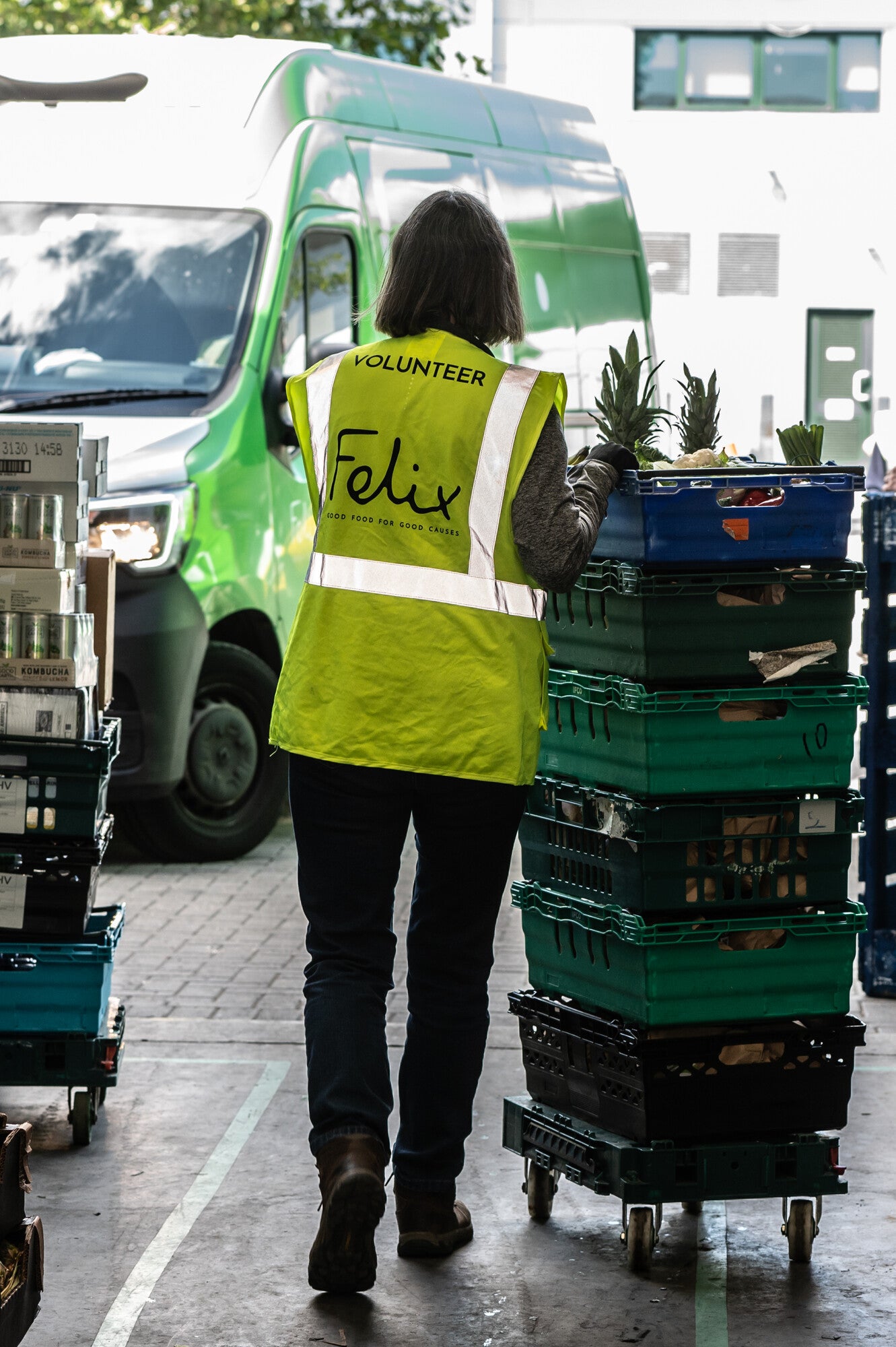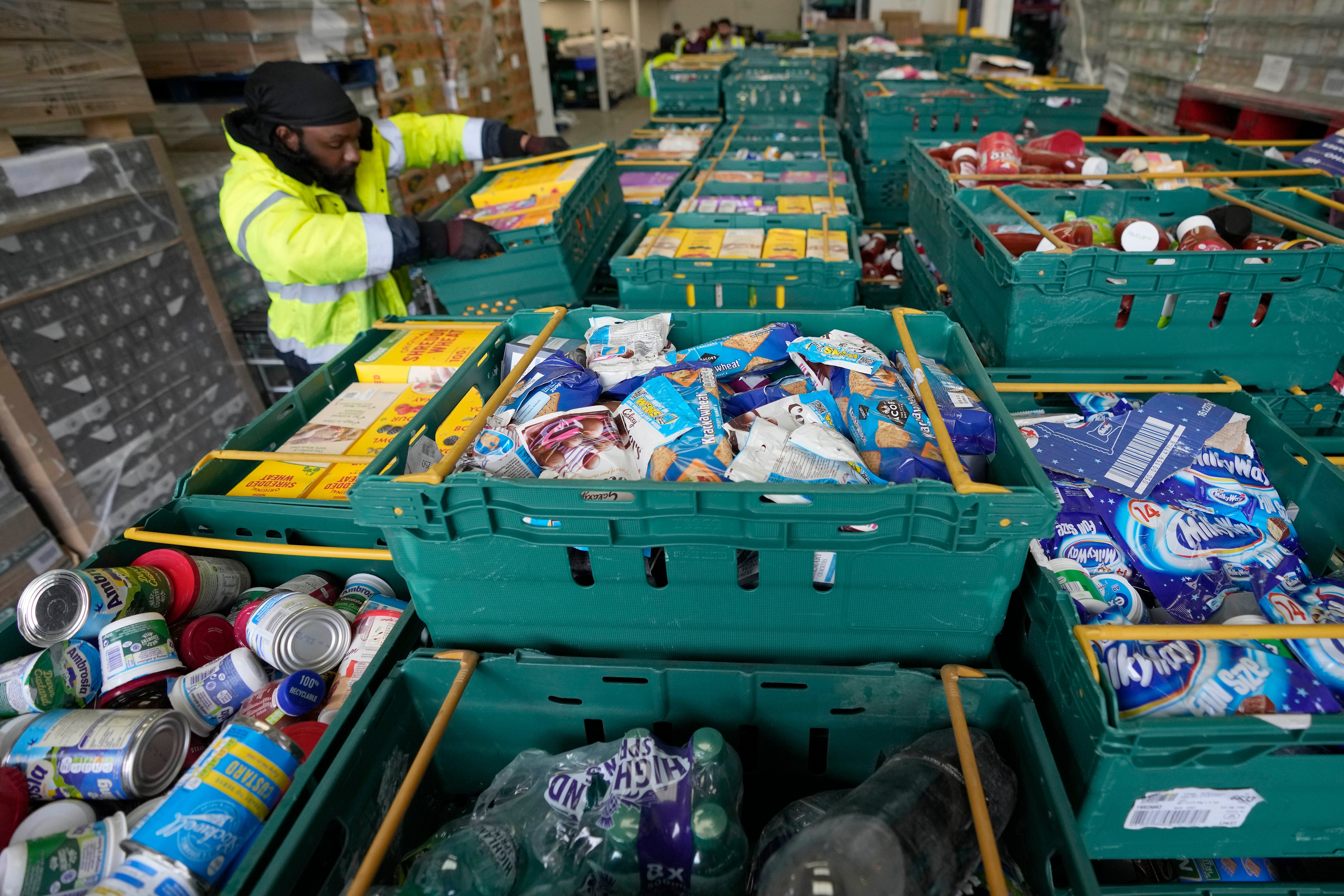How The Felix Project became London’s fourth emergency service
Their vans have become an ever-present sight in the capital, a literal lifeline for the thousands of people they help feed every week. Polly Dunbar looks at the remarkable story of how a food redistribution charity became one of the most successful in Europe and why it’s needed more than ever as one in four parents can’t afford to feed their children
An astonishing charity success now dominates London as a hunger crisis has gripped the most vulnerable in the capital. It is a network of volunteers from The Felix Project – thousands of people who are spread across the city in an unprecedented effort to assuage the hunger of those in need.
The green and white Felix Project vans are almost as frequently seen as the Evening Standard delivery vans once were and provide a crucial support system. The idea for the initiative was born 10 years ago, named after a remarkable 14-year-old boy who died tragically of meningitis. It eventually led his parents on a path to find a way to celebrate his kindness and also meet a desperate need of the poorest who were unable to find enough means to feed themselves.
Justin and Jane Byam Shaw were particularly inspired by a time when Felix had helped to feed a group of boys from London who had turned up to play in a football tournament on empty stomachs. “He couldn’t quite believe what he was hearing when he found out that some of those boys hadn’t had any breakfast,” says Jane.
In 2016, The Felix Project was born to “fulfil some of his dreams”, by rescuing food that would otherwise go to waste – from wholesalers, supermarkets, farms, restaurants and high street chains such as Pret a Manger – and giving it to community organisations and schools.
At first, there was just one van and a depot in west London. Today, thanks to the Byam Shaws’ extraordinary entrepreneurial skill and vision, the organisation is Britain's biggest charity success of the past 25 years. Rarely a day goes by without you seeing one of its distinctive green vans whipping through London’s streets. Emblazoned with a logo taken from a card written by Felix, they are a literal lifeline threading through the city and connecting people with an emergency service every bit as vital as the others.
“For people at the lowest ebb of their lives, make no mistake, Felix is a godsend. And not just for their stomachs, but for their state of mind,” says Stephen Chamberlain, founder of St Laurence’s Larder. “This food is the difference between health and sickness and, quite possibly, life and death.”
The Felix Project is now London’s largest food redistribution charity, giving to over 1,200 community organisations and schools every week. And none of it could happen without its army of helpers. In 2024 more than 13,000 people volunteered with The Felix Project and it was the biggest year to date at the Felix Kitchen with nearly 1.3 million freshly prepared, nutritious meals cooked and delivered to charity partners. It is now the largest food distribution charity in Europe and is on track to hand out 43 million meals this year.
Unsurprisingly, the King and Queen have made supporting the organisation’s work one of their key priorities during his reign. And on Thursday its remarkable achievements will be celebrated at a special event thrown by its founders to thank all those who have enabled their work to happen.

And it’s clear that work has never been more needed. Last week, Department for Work and Pensions data revealed that a staggering three in 10 British children are living in poverty, after the number soared from 4.3 million to 4.5 million between 2023 and 2024.
The DWP also admitted that 250,000 more people, including 50,000 children, could fall into poverty by 2029-2030 following the government’s sweeping welfare cuts and Rachel Reeves’s spring statement. As the cost of living soars, research carried out recently by The Felix Project found that more than half of working families surveyed had been forced to turn to a food bank in the past year. It also found that one in four working parents regularly struggle to afford to feed their children.
At the same time, Britain wastes almost 10m tonnes of food every year. Less than 1 per cent of waste from the food industry is recycled for human consumption. This is both morally abhorrent when so many are going hungry, and a disaster for the planet: every tonne of food waste ending in landfill produces approximately 4.2 tonnes of greenhouse gases. If it were a country, food waste would be the third highest emitter of greenhouse gases behind the US and China.

“The numbers are astounding on both sides of the equation,” says Charlotte Hill, who has been The Felix Project’s chief executive for the past three years and has witnessed the brutal impact of soaring food and energy prices. “Everything has gone up much, much faster than wages,” she says. “There’s been a big shift towards people you wouldn’t traditionally have thought would rely on food aid. We see teaching assistants in our schools and hospital workers, people who work incredibly hard, but once they’ve paid their bills and put food on the table for their children, they’re having to skip meals themselves.”
The benefits of the food given to grassroots organisations go far beyond feeding its recipients. “It frees up the organisations’ budgets,” says Hill. “Rather than paying for food, if you’re a homeless shelter, you can pay for an additional advice or health worker or something that gives increased social impact and helps lift people out of poverty.”
It is this kind of visionary thinking that has seen The Felix Project innovate time and time again. Last July, the Felix Multibank in Greenford was launched in partnership with Gordon Brown, Amazon and Comic Relief. This expanded their remit beyond food because it became ever more obvious that those who can’t afford to feed their families aren’t able to afford household items either. In the first six months, they distributed 1.5 million items, including nappies, toothpaste and sanitary products.

A new Felix Food Factory in Deptford means they can process and distribute foods that otherwise couldn't be redistributed immediately. So a glut of tomatoes in August becomes bottled tomato sauce and crates of bananas become dehydrated banana chips. In their Canary Wharf office, they are growing herbs in vertical farming pods, a project soon to be expanded.
The Felix Project’s policy unit, led by Charlotte and Felix’s brother Dan, was instrumental in persuading the government to award a £15m grant to the redistribution sector. Next up is a campaign focussing on food donation legislation in the shape of a Good Samaritan law like they have in the US. This would free donors from a high threshold of liability and treat food donations like cash donations for tax purposes.
But for Paul Wilson, who oversees the food banks in London’s East End, it’s the sense of community that he and his volunteers are most proud of. Mothers with buggies, single adults and the elderly mingle, and volunteers give out bags containing staples such as bread, fruit and vegetables. But it’s not a depressing scene. Far from it, the chat is lively and spirited.
“The beneficiaries who come find kindness and compassion, and a chance to talk to other people,” he says. “It’s a social thing, not a glum one.”
For the 200 or so households supported by schemes in Mile End and Aldgate, the food is a vital safety net – and increasing numbers of those turning up for it don’t fit the stereotype many might expect. “Some are on benefits, but many who come to the foodbank are in paid work,” says Wilson, the community engagement manager at the housing association EastendHomes. “You can’t ever tell who’s experiencing food insecurity, it’s people of all ages and backgrounds.”

E5 Pantry was set up five years ago to support families in Hackney with special educational needs and disabilities, but has expanded to meet the growing need of the local community. Volunteer drivers collect the food provided by The Felix Project from the nearby hub at Hackney City Farm and distribute it to hundreds of families. “With the food we’re able to give them, people are able to use that money on electricity, or maybe a treat for the children, which is really vital,” says Joseline Crome, who works there.
Rachael began using the service a year ago, after she was diagnosed with a heart condition which left her unable to work and having to claim benefits. The money she no longer spends on food goes towards hygiene products and clothing, including a good quality, thick winter coat that saw her through this winter. “This food and Felix have really helped me,” she says.
Wilson sees similar stories. “One woman told me the food meant she could afford broadband at home for the first time,” he says. “It’s the most effective work I’ve done in my 30 years of working in this field; it’s transformational change.”

Among its high-profile supporters is the King, a passionate champion of sustainability, who became a personal donor two years ago. The Foodbank Freezer Fund he convened has supplied 800 fridges and freezers to food charities across Britain. “It was a game-changer for our community organisations, because they can say yes to so much more food, says Hill.
The King was so inspired by The Felix Project’s work that he has since partnered with the organisation to launch the Coronation Food Project, to increase food rescue and redistribution throughout the country. “He’s been an inspiration to work with on it,” says Hill. “He’s hugely engaged in driving it forward.”
She says the charity now has a “great opportunity” to work with Defra to change subsidies for farmers, to encourage them to send their surplus edible food into the food redistribution sector, rather than incentivising them to send it to be used for animal feed and fertiliser. “In America, they redistribute 8 per cent of food, and here it’s only 1 per cent, so we should be doing much better,” she says.
The rising poverty levels mean demand for The Felix Project’s work will continue to grow, too, and many would argue it is doing a job that is the state’s responsibility. But Hill says: “If you can create an ecosystem where the food industry, the voluntary sector and the state all collaborate, it works at its best.”
She points to the work the organisation has done with London mayor Sadiq Khan to address holiday hunger, by providing free, nutritious meals to holiday programmes to ensure children have access to food during breaks from school.

“It’s on all of us to come together and bring the best of what we can do,” she says.
Thursday’s event will take place at Refettorio Felix, a drop-in centre and community kitchen serving vulnerable people in Earl’s Court. The food served will all be Felix surplus, cooked by Felix apprentices.
There’s much to celebrate, says Hill. “You’re also seeing the amazing community of people who show London at its best. It’s very empowering.”
When she and her husband first started The Felix Project, Jane Byam Shaw said: “We felt Felix would have done amazing things in his life – and we wanted to rise to the challenge of living out some of those things in a way he wasn’t able to do.”
The millions of people the charity has helped in the 10 years since his death are testament to the extraordinary success they have achieved in his name. His father, Justin Byam Shaw, reflects: “It sometimes occurs to me that there’s a causal link between Felix’s death and being able to help hundreds of thousands of people every week, and that the second couldn't have happened without the first. So in a sense that is his huge gift.”
Find out more about The Felix Project here


Join our commenting forum
Join thought-provoking conversations, follow other Independent readers and see their replies
Comments